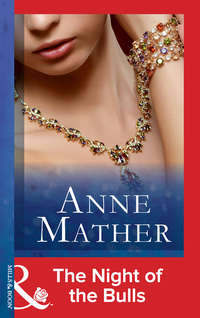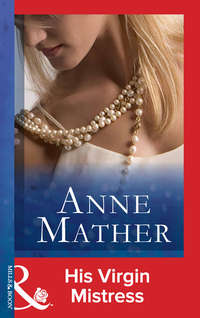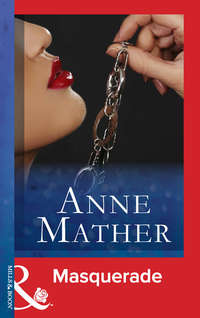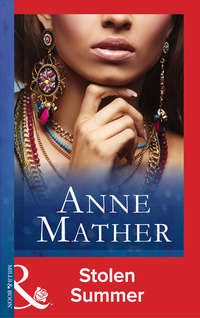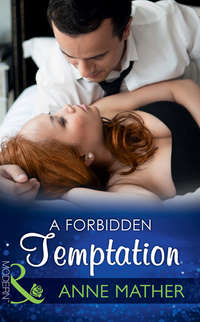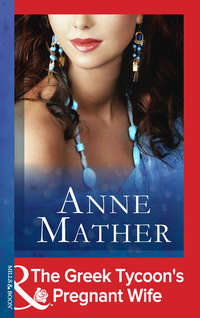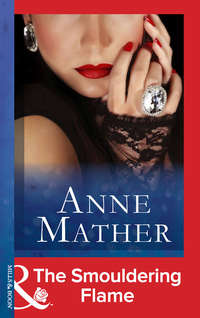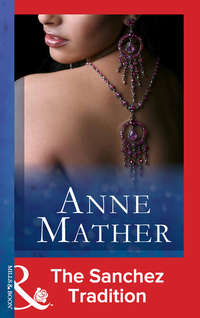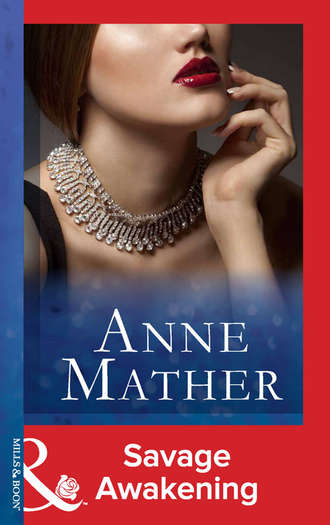
Полная версия
Savage Awakening

Mills & Boon is proud to present a fabulous collection of fantastic novels by bestselling, much loved author
ANNE MATHER
Anne has a stellar record of achievement within the
publishing industry, having written over one hundred
and sixty books, with worldwide sales of more than
forty-eight MILLION copies in multiple languages.
This amazing collection of classic stories offers a chance
for readers to recapture the pleasure Anne’s powerful,
passionate writing has given.
We are sure you will love them all!
I’ve always wanted to write—which is not to say I’ve always wanted to be a professional writer. On the contrary, for years I only wrote for my own pleasure and it wasn’t until my husband suggested sending one of my stories to a publisher that we put several publishers’ names into a hat and pulled one out. The rest, as they say, is history. And now, one hundred and sixty-two books later, I’m literally—excuse the pun—staggered by what’s happened.
I had written all through my infant and junior years and on into my teens, the stories changing from children’s adventures to torrid gypsy passions. My mother used to gather these manuscripts up from time to time, when my bedroom became too untidy, and dispose of them! In those days, I used not to finish any of the stories and Caroline, my first published novel, was the first I’d ever completed. I was newly married then and my daughter was just a baby, and it was quite a job juggling my household chores and scribbling away in exercise books every chance I got. Not very professional, as you can imagine, but that’s the way it was.
These days, I have a bit more time to devote to my work, but that first love of writing has never changed. I can’t imagine not having a current book on the typewriter—yes, it’s my husband who transcribes everything on to the computer. He’s my partner in both life and work and I depend on his good sense more than I care to admit.
We have two grown-up children, a son and a daughter, and two almost grown-up grandchildren, Abi and Ben. My e-mail address is mystic-am@msn.com and I’d be happy to hear from any of my wonderful readers.
Savage Awakening
Anne Mather

www.millsandboon.co.uk
CONTENTS
Cover
About the Author
Title Page
CHAPTER ONE
CHAPTER TWO
CHAPTER THREE
CHAPTER FOUR
CHAPTER FIVE
CHAPTER SIX
CHAPTER SEVEN
CHAPTER EIGHT
CHAPTER NINE
CHAPTER TEN
CHAPTER ELEVEN
CHAPTER TWELVE
CHAPTER THIRTEEN
CHAPTER FOURTEEN
CHAPTER FIFTEEN
CHAPTER SIXTEEN
Copyright
CHAPTER ONE
IT WAS the chimes of the church clock that woke him.
Ironically enough, he’d grown used to sleeping through the wailing call of the muezzin. Four years in North Africa, the last eighteen months in an Abuqaran jail, had made such sounds familiar to him. That, and the staccato shots that erupted from time to time across the prison yard.
Not that he’d slept well, of course. A thin blanket thrown on a concrete floor was hardly conducive to a sound—let alone a comfortable—slumber. But it was amazing what the body could get used to, how little sustenance it needed to survive.
Still, he had survived, and after six months back in England he should have become accustomed to the ordinary sounds of civilised living again.
But he hadn’t. He was still coming to terms with the fact that he was not the man he used to be and whether or not he slept well—or at all—was a small problem in the larger scheme of things.
Not liking the direction his thoughts were taking, he thrust back the covers and swung his legs out of bed. At least sitting up no longer caused the sickening feeling of dizziness he’d suffered during his first few weeks of freedom. And his limbs, which had been almost skeletal when he returned, were gradually filling out, his muscles strengthening with the regular workouts he subjected himself to every day. The doctors had warned him not to try and do too much, but there’d been no way he could control the desire to regain his health and strength, and moving at a steady pace had never been good enough for him.
Consequently, although his psychological problems showed little sign of improvement, physically he felt much better than he had even a month ago.
Which was such a sucker, he chided himself grimly, pressing down on the mattress and getting a little unsteadily to his feet. Sometimes he had the feeling he’d never make it, never recover even the belief in himself he’d once enjoyed. Perhaps it would be kinder all round if other people realised it, too.
Nevertheless, he’d had to give it a try. And, to that end, he’d bought this house in a village far enough from London and the life he and Diane had had there before he’d been sent to Abuqara to cover the civil war.
Diane didn’t approve of his decision. Mallon’s End was the village where she’d grown up and where her parents still lived. She thought he was crazy wanting to leave the exciting opportunities London presented behind. He’d already been offered his old job with a commercial television station back again and she couldn’t understand why he’d turned it down. He didn’t honestly know himself. But, thanks to the legacy his grandmother had left him, money wasn’t a problem, and there was always that offer of a book deal if he should choose to write about his experiences as a prisoner of the rebel forces in Abuqara.
He crossed the floor to the windows, shivering a little in the cooler air. The polished boards beneath his feet were cold, too, but he didn’t notice them. He was used to going barefoot. The first thing his captors had done was take his shoes away from him. And although initially his feet had blistered and been agony to walk on, gradually they’d hardened up.
All the same, he was used to temperatures that usually hovered near forty degrees Celsius in daylight hours, and although England was supposed to be enjoying a heatwave at the moment, he hadn’t noticed.
Pulling the curtain aside, he peered out. Outside the long windows, the gardens of the house stretched in all directions, lush with colour. To someone used to bare walls or stark packed-earth streets stripped of any sign of civilisation, it was an amazing view. Even the months he’d spent since his return in his comfortable apartment in Belsize Park hadn’t prepared him for so much beauty. This was what he needed, he told himself, what he’d dreamed of while he was in prison. It was a humanising experience.
Beyond the grounds of the house, the churchyard offered its own kind of absolution. He could see cottages through the swaying branches of the elms and yews that guarded the lych-gate, and an occasional car passing the bottom of his drive on its way into the village proper.
It was all so—yes, that word again—civilised. But he was still isolated from the people and places that had once been so familiar to him. It was strange but while he was a prisoner, he’d longed for company, for someone who spoke his own language.
He’d had some conversations with the captain of the rebel forces. Fortunately, he’d known a little of his language, and the man had been surprisingly intelligent and well read.
Yet now he was home, he found himself shunning company, avoiding conversation. He was a mess, he thought ruefully. Diane was right. He wouldn’t blame her if she got sick of trying to get through to him.
Even so, he thought as he moved away from the windows, given the hassle of the last few months, surely he had a right to some peace, some tranquillity. God knew he hadn’t been prepared for the amount of interest his return had engendered, but what with interviews, phone-ins, online question-and-answer sessions, he’d begun to feel persecuted all over again. He’d wanted out, not just out of London, but out of that way of life. His old way of life, he acknowledged. And if that meant he was cuckoo, then so be it.
A shower removed a few more of the cobwebs that were clouding his system, and after towelling himself dry, he dressed in drawstring sweat pants and a black cotton T-shirt. He pulled a rueful face at his roughening jawline and decided he liked not having to use a hair-dryer. In North Africa his head had been shaved, and since his return he’d kept his hair barely long enough to cover his scalp. Diane said it suited him, but then, she’d say anything to boost his self-esteem. She was worried about him, worried about their relationship. And he couldn’t say he blamed her.
The house felt chilly as he went downstairs. It was barely seven o’clock, after all, and until he’d worked out how the central heating operated, he’d have to live with it.
But at least the place had central heating, he mused gratefully. These old houses often didn’t, but the previous owner had apparently demanded that comfort and he was glad.
Nevertheless, he would have to see about getting some decorating done. The heavy flock wallpaper on the stairs and the crimson damask in the main reception room would definitely have to go, and he needed a lot more furniture than the bed and the couple of armchairs he’d brought with him. The rest of his furniture was still in his London apartment and, until he’d definitely decided he was going to stay here, it would be staying there.
But this place was big enough for several living and bedroom suites and he couldn’t exist with what he had. He would have to visit a saleroom; an auction saleroom, perhaps. These rooms would not take kindly to modern furniture.
Thankfully, the kitchen faced east and already it was warm and bathed in sunlight. Like the rest of the house, it could do with some updating, but he decided he rather liked the rich mahogany units and the dark green porcelain of the Aga.
However, the Aga presented another problem and, rather than try to figure it out this morning, he started a pot of coffee filtering through the strong Brazilian grains he preferred and turned with some relief to the gas hob.
Pretty soon, the kitchen was filled with the appetising scents of hot coffee and frying bacon and he was glad his mother had suggested taking a box of groceries with him. Left to himself, he would probably have had to go out for breakfast and that was definitely not part of his plan.
The kitchen windows overlooked the gardens at the back of the property and he stood staring out at an overgrown vegetable plot as he drank his first cup of coffee of the day. There was such a lot to do, he reflected with a twinge of apprehension. Had he bitten off more than he could chew?
But, no. The whole idea was that he should be able to fill his days to the exclusion of all else. He didn’t want time to relax, time to think. Until he’d figured out whether he was ever going to feel normal again, simple manual labour was what he needed.
The sound of footsteps clattering across the paved patio outside brought his brows together in a frown. Dammit, he thought. No one was supposed to know he was here yet. He’d deliberately stowed the four-by-four in the garage to disguise his presence. Who the hell had discovered he’d moved in?
He moved closer to the windows and looked out. He couldn’t see anyone and that bothered him, too. He had heard the footsteps, hadn’t he? He couldn’t be starting having hallucinations. God, that would be the last straw!
He drew back, setting his coffee down on the pine-blocked table behind him. But as he moved to check on the bacon, he heard the footsteps again and a sick feeling of apprehension invaded his stomach.
There was no one there. He would have seen a shadow cross the window if anyone had really walked past. Which meant? Which meant what?
Swearing, he moved to the door and, flicking the lock, he yanked it open, all in one fluid motion. And disturbed a young girl who was squatting down beside what looked like a rabbit hutch, feeding dandelion leaves into the cage.
He must have frightened her, he thought, his own feelings of relief flooding his system with adrenalin. But it was good to know he wasn’t losing his mind as well as his—
He severed that thought and forced a rueful smile to his lips as the girl got hurriedly to her feet. Sufficient unto the day, he quoted grimly. He was alive, wasn’t he? And sane? Which was definitely a bonus.
‘Who are you?’
The words caught him unawares. That was his question, he thought, half resenting her presence of mind. She was looking at him as if he was the intruder, and he gave a rueful shake of his head.
‘My name’s Quinn,’ he said, humouring her. ‘Who are you?’
‘Um—Nancy,’ she answered, after a moment. ‘Nancy—Drew.’ And then, before he could comment on her name, a frown creased her childish features. ‘Do you live here?’
‘I do now,’ said Quinn drily. ‘Is that a problem?’
Nancy shrugged. ‘No,’ she conceded, but she sounded less sure of herself now. ‘That is—you don’t have a dog, do you?’
Quinn grinned. He couldn’t help himself. ‘Not at present,’ he replied, considering it. ‘Do you like dogs?’
‘I do.’ Nancy sounded doubtful none the less. ‘Grandad has a dog. A retriever. But he’s very naughty.’
‘Who, your grandad?’
Quinn couldn’t help himself and Nancy gave him a reproving look. ‘No!’ she exclaimed impatiently. ‘Harvey. He used to chase Buttons all around the garden. He was terrified!’
‘Harvey?’ asked Quinn innocently and Nancy’s face took on a suspicious stare.
‘Buttons,’ she corrected him. ‘You’re teasing me, aren’t you?’
Quinn sighed. ‘Just a little.’ He paused. ‘Who’s Buttons?’
‘My rabbit,’ said Nancy, squatting down again and pointing to what Quinn now saw was a cage, as he’d thought. ‘Mummy said I ought to find another home for him. So I did.’
Quinn suspected her mother had not meant in someone else’s garden, but he didn’t say anything. Instead, he hunkered down beside her and saw the white nose of what appeared to be quite a large rabbit nuzzling at the wires of its cage.
‘This is Buttons,’ went on Nancy, performing the introduction. ‘Isn’t he sweet?’
‘I guess.’ Quinn knew nothing about rabbits so his opinion was limited. ‘But isn’t his cage rather small?’
‘Mmm,’ Nancy agreed. ‘That’s why I used to let him out. But as I said—’
‘Harvey chased him,’ Quinn finished for her and Nancy nodded.
‘He doesn’t realise that Buttons is frightened of him.’
‘Well, dogs chase rabbits,’ said Quinn matter-of-factly. ‘It’s what they do.’
‘So—can he stay here?’ asked Nancy quickly, and Quinn got abruptly to his feet.
‘I—maybe,’ he said slowly. ‘If your mother approves.’
‘Oh, she doesn’t know,’ said Nancy airily, standing up, too. Then, more anxiously, ‘You won’t tell her, will you?’
Fliss had opened her mouth to shout Amy’s name again when she saw her. The door to the Old Coaching House was open and a man was standing on the threshold talking to her daughter.
A relieved breath escaped her. She hadn’t really been worried, she assured herself, but you heard such awful stories these days about children being abducted and Amy was only nine years old.
Nevertheless, she didn’t approve of her coming here without permission, even if Amy was naturally familiar with the place. She’d accompanied her mother often enough during school holidays and the like and she knew the grounds almost as well as her own garden.
But that didn’t alter the fact that things had changed now. Old Colonel Phillips was dead and, although she hadn’t heard about it, the Old Coaching House had apparently been sold. To someone Amy didn’t know, Fliss reminded herself, quickening her step. How many times had she warned her daughter not to talk to strange men?
The man became aware of her presence before her daughter did. His head turned and she got a swift impression of a hard, uncompromising face with dark, deeply tanned features. He was tall, that much was obvious, but there didn’t appear to be an ounce of spare flesh on his leanly muscled frame.
He looked—dangerous, she thought fancifully, not liking the conclusion at all. He looked nothing like the people who usually retired to Mallon’s End, and she wondered why someone like him would choose to buy a house in such a quiet, unexciting place.
She got the distinct impression that he would have preferred to cut short his conversation with Amy and close the door before she reached them. But something, an unwilling acceptance of his responsibilities—or common decency, perhaps—persuaded him to at least acknowledge her before he made his escape.
For her part, Fliss was more curious than anything else. As she got nearer, she could see that he was younger than she’d imagined; possibly late thirties, she guessed, with very short dark hair that added to his harsh appearance.
But for someone who looked so menacing, he was absurdly attractive. Goodness! Fliss swallowed a little nervously, feeling butterflies fluttering in her stomach. Who on earth was he?
‘I—I’m sorry,’ she began, deciding an apology was in order. ‘If my daughter’s been troubling you—’
‘She hasn’t,’ he said, his voice low and a little hoarse, and Fliss saw the way Amy’s shoulders hunched in the way she had when her mother embarrassed her.
‘Oh, Mum!’ She grimaced, casting an impatient look in Fliss’s direction. ‘I’m not a baby, you know.’
Fliss reserved judgement on that one. In her opinion Amy was still young enough to warrant the anxiety she had felt at her disappearance.
‘I’ve been looking for you,’ she said, deciding any chastisement could wait until later. ‘Didn’t you hear me calling you?’
Amy shrugged now. ‘I might have done,’ she said airily, but Fliss wondered if it was only her imagination that made her think her daughter was looking slightly uneasy now. What had been going on, for heaven’s sake? What had this man been saying to her?
‘Well, why didn’t you answer, then?’ she demanded, before allowing their audience a slight smile. ‘I was worried.’
‘I’m sure Nancy didn’t mean to cause you any unnecessary distress, Mrs Drew,’ the man broke in abruptly, and if Fliss hadn’t been so shocked by the name he’d used, she’d have realised there was an increasing weariness in his harsh tone. ‘No harm done.’
‘You think not?’ Fliss couldn’t let it go. She looked down at her daughter. ‘Amy? Did you tell this—gentleman—that your name is Nancy Drew?’
Amy flushed now. ‘What if I did?’
Fliss shook her head. ‘I don’t believe it.’
The man breathed heavily. ‘I gather that’s not her name?’
‘No.’ Fliss tried to control her temper. It wasn’t his fault, after all. ‘It’s Amy. Amy Taylor. Nancy Drew is just—’
‘Yeah, I know who Nancy Drew is.’ He interrupted her drily. ‘Way to go, Nancy. Solved any exciting cases lately?’
Amy pursed her lips, but she reserved her anger for her mother. ‘Now see what you’ve done!’ she exclaimed. ‘You’ve made me look silly in front of Quinn!’
‘Quinn?’
Fliss’s eyes moved to the man again and glimpsed the spasm of resignation that crossed his face. ‘Matthew Quinn,’ he agreed flatly. ‘I’ve bought this place.’
‘Oh.’ Fliss wondered why he seemed so reluctant to tell her that. ‘Oh, well—good,’ she murmured. ‘I hope you and your—er—family will be very happy here.’
‘I don’t have a family,’ he replied in that harsh, abrasive voice that Fliss found as sexy as his appearance. ‘But thanks.’
‘You’re welcome.’
Fliss managed a polite smile and then caught her lower lip between her teeth. Would this be a good time to explain why Amy felt she had a right to enter his garden at will? Maybe he would need a housekeeper, too. If he didn’t have a wife…
‘Come on, Mum.’ Amy caught her arm now and attempted to pull her away. ‘It’s nearly time for school.’
‘Is it?’
Fliss’s brows narrowed. Since when had Amy been so eager to go to school? Her suspicions resurfaced. What had she been doing? What had this man been saying to her that she didn’t want her mother to know about?
Her eyes returned to his dark face, but when he met her gaze with a cool appraisal she was forced to look away. Her gaze dropped down over his tight-fitting T-shirt, over drawstring sweat pants that couldn’t hide the impressive bulge of his sex, the powerful length of his legs. And bare feet. Her skin prickled. He must have just got out of bed.
Had Amy awakened him?
And then she saw the box-like structure that was wedged beside the doorstep and comprehension dawned. The compulsive—if unwilling—awareness his hard male beauty had had on her disappeared beneath a sudden wave of frustration.
Grasping Amy’s arm before she could get away from her, she pointed to the offending item. ‘What is Buttons’s hutch doing here?’ she demanded shortly. ‘Is he inside?’ She dipped her head. ‘Yes, I can see he is. Come on, Amy. What is he doing here?’
Amy’s shoulders drooped and Fliss wasn’t at all surprised when her eyes moved appealingly to Matthew Quinn. Of course, she thought irritably. He must have known about this. That was what he and Amy had been talking about when she’d interrupted them. And he hadn’t said a word, even though he must have realised that she hadn’t been aware of what was going on.
She turned on him then, prepared to voice her indignation—however unjustified that indignation might be—and found him leaning tiredly against the frame of the door. His face was drawn now and scored with a haunting weariness she was sure wasn’t just the result of lack of sleep.
Immediately, all thought of reprimanding him fled. The man looked ill, for goodness’ sake. And exhausted. Or utterly bored by their exchange.
‘Um—are you all right?’ she ventured, and at her words he seemed to make a conscious effort to recover himself.
‘A little fatigued is all,’ he assured her firmly, but he backed into the kitchen as he spoke and now she could smell the acrid aroma of charred bacon. He glanced behind him, evidently noticing the same problem, and, forestalling any offer she might have made, he added, ‘Can we continue this at some other time, Mrs Taylor? I’m afraid my breakfast is burning.’
CHAPTER TWO
FLISS endeavoured not to think about Matthew Quinn again until she’d taken her daughter to school.
Instead, she’d concentrated on Amy’s behaviour, on how disappointed she was that the little girl had lied to her. When, faced with the prospect of Buttons being sent to the local animal shelter for his own safety, Amy had come up with a solution of her own, her mother had been relieved. A friend at school had offered the rabbit a home, she’d said, and Fliss had allowed her to take Buttons away on her grandfather’s wheelbarrow, never dreaming that Amy had had no intention of giving the rabbit to anyone.
Now, however, her deception had been discovered, and in the most embarrassing way possible. Matthew Quinn either considered Fliss was an unfit mother—a label that had been slung at her more times than she cared to remember since, at the age of sixteen, she’d discovered she was pregnant—or an unfeeling one, which was probably worse.
Amy, attempting to justify her actions, had assured her mother that ‘Quinn’ hadn’t minded the fact that he had had an unwanted squatter on his land, but Fliss believed she knew better. From what she’d seen of him, she thought Matthew Quinn was not a well man, and he’d probably only been humouring the child to avoid further argument.


